How fast is 5G download speed? Is it POWERFUL as rumored?
The rollout of 5G has made headlines recently.
Many people wonder how fast is 5G download speed ?
What will it bring to the table?
What are the differences between 4G vs 5G speeds?
And if you are one of those who are seeking answers to various questions related to this latest cellular technology, you've come to the right place.
This post will cover everything.
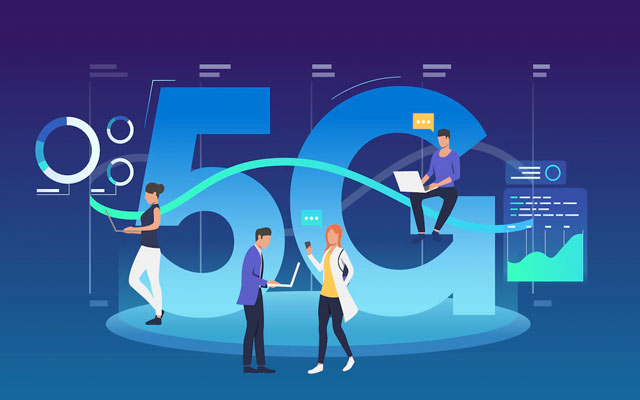
Average 5G download speed Mbps
What is 5G?
5G is the fifth generation mobile network designed to connect virtually everyone and everything.
The benefits that this network brings about include better speed, lower latency, and the ability to connect a lot more devices at once.
How does 5G work?
All four previous generations of cellular networks used macroscopic cell towers that require vast power supplies to transmit over long distances.
This latest cellular network works a little differently.
This mobile network uses a combination of frequencies from multiple bands to maximize throughput.
In addition to traditional microwave towers, this wireless network will also use a large number of much smaller microwaves for the new millimeter-wave spectrum bands to create an ultra-high-speed network coverage.
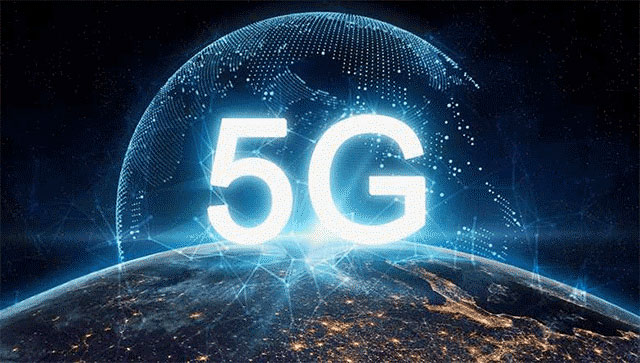
How does 5G work?
This cellular network also uses Massive MIMO, a new digital technology that uses many targeted beams to spotlight and track users around a cell site.
This helps improve coverage and capacity.
Current network technologies work like headlights, illuminating an area but wasting a lot of light/signal.
Part of the 5G rollout includes installing Massive MIMO and New Radio for all mobile devices and network base stations on the existing 4G infrastructure.
How Fast is 5G download speed?
Theoretically, the maximum 5G download speeds can range from 1 gigabit per second to 10 gigabits per second, depending on your coverage.
According to recent Speedtest Intelligence data, Verizon's 5G Ultra Wideband speeds in Denver were measured at 988.37 Mbps, an increase of 820.2 percent above LTE.
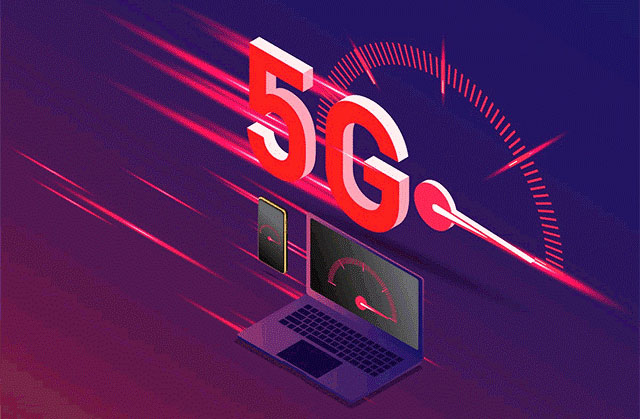
5G speeds
A recent RootMetrics® report also showed that Verizon was the only carrier in any city to deliver a 5G maximum speed of more than 1.0 gigabits per second, or Gbps.
Verizon's 5G median speeds were over four times faster than its non-5G coverage.
The network has three frequency bands, and each one has its speed.
The low band spectrum has 50-250 Mbps. The high band can reach 3 Gbps.
In reality, 5G speeds are dependent on the type of 5G connectivity you're using.
5G comprises several distinct frequency bands.
The low-band spectrum (Sub-6) can travel vast distances and penetrate barriers, but it provides slower speeds.
Whereas high-band mmWave spectrum has ultra-fast download speeds, radio waves can’t go through obstacles.
Download speeds are also affected the number of people connected to the network.
The more people use a cell tower at the same time, the less bandwidth may be given to you directly.
That's why mmWave may be useful in settings like stadiums, where thousands of people could be linked to a network at the same time.
5G latency
3G latency is approximately 60 milliseconds (ms), but on 4G it is nearly half that, at around 35ms.
5G has exceptional response times of 1ms.
However, this number will not be attained on day one.
According to the 2021 Ookla report, the median 5G latency ranges from 29ms to 33ms.
That will assist with all of the things we now use data for, but it is also required for future mobile data applications, such as self-driving cars, which must respond to inputs and changes in scenarios instantaneously.
5G vs. 4G speeds
4G can now hit the maximum speeds of up to 100 Mbps, though its performance in the real world is generally no more than 35 Mbps. 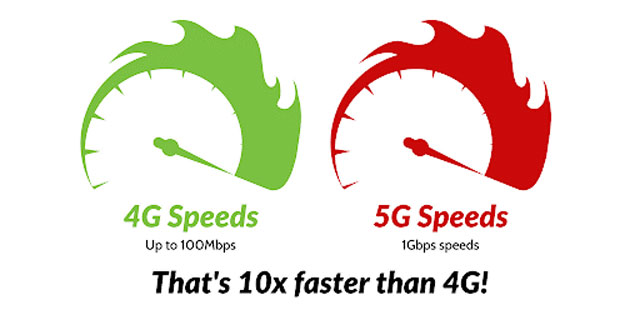
4g vs 5G
Theoretically, 5G technology could be from 10 to 100 times faster than 4G.
However, according to recent Speedcheck research, the average speed of this network, in reality, is now 59Mbps, which isn't significantly quicker than a normal 4G network.
Depending on the carrier, this varies slightly.
Overall, due to the new technologies, spectrum, and frequencies it uses, the latest network has some benefits over 4G:
-
Higher speed
-
Less latency
-
Capacity for a larger number of connected devices
-
Less noise
-
Better efficiency.
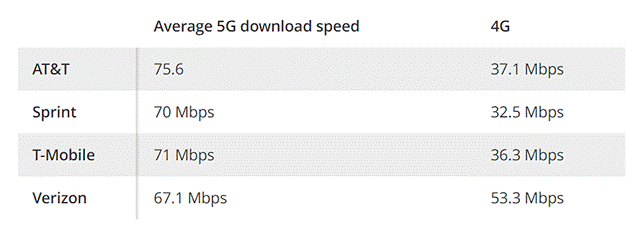
Compare 5G download speed versus 4G. Source: tomsguide.com
What can we do with 5G?
With swift speeds, 5G will allow for gigabit downloading in seconds.
Even before it is completely deployed, I was able to pull down a 1-hour, 48-minute video in 49 seconds using AT&T's 5G Plus network.
Even with T-Mobile's low-band 5G network, we were able to pull down the 3-hour Netflix movie in less than 3 minutes.
That's cool!
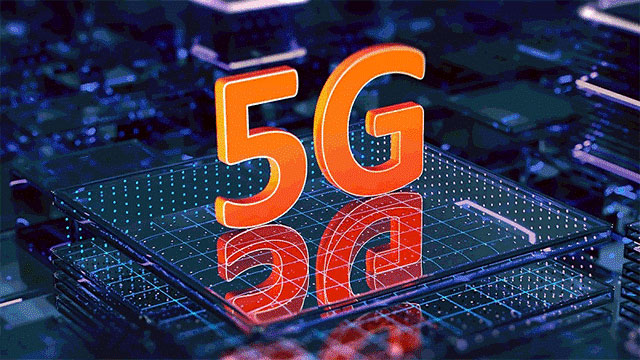
With 5G, it takes less time to download Netflix movies
In addition to that, this network will have reduced latency.
Experts believe that it will cut latency to less than 1 millisecond, exceptional for online gaming without any lag and jitter.
How to test download speed?
To know “how fast is my download speed?” as well as check if 5G speed is fast or not, I decided to run a test.
There is an array of apps available out there that you can use to see what type of performance you're receiving as well as the strength of your signal.
I chose MySpeed - the simplest online download speed test I have tried.
Quick - Convenient - Compact.
MySpeed comprises all features I favor in a speed test tool.
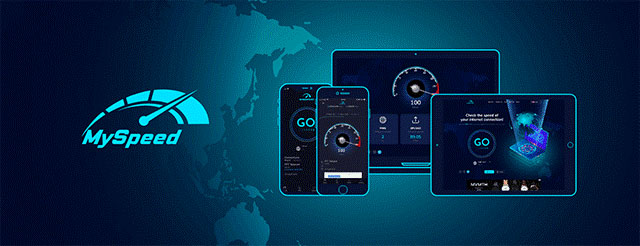
Check my speed
Don’t you know how to check your internet speed?
Follow my simple guide with my favorite tool MySpeed:
Step 1: Visit the address gospeedcheck.com or you can search Google for “MySpeed”
Step 2: On its homepage, click the biggest circle “Go” button to start the test.
Step 3: After seconds, you will get results of ping, download speed, and upload speed.
Is it stupid-simple?
Everyone can do it, even a person who doesn’t use the computer regularly.
What is considered good download speed?
Now, you’ve got your current download speed result.
What about it? Is it good or bad?
Similarly, “What is a good download speed? or What should my download speed be ? are common questions.
The answer is from 12 to 25 Mbps.
A decent internet connection has a speed of at least 25 Mbps.
Most online activities, including HD streaming, online gaming, web surfing, and music downloads, will be supported at these speeds.
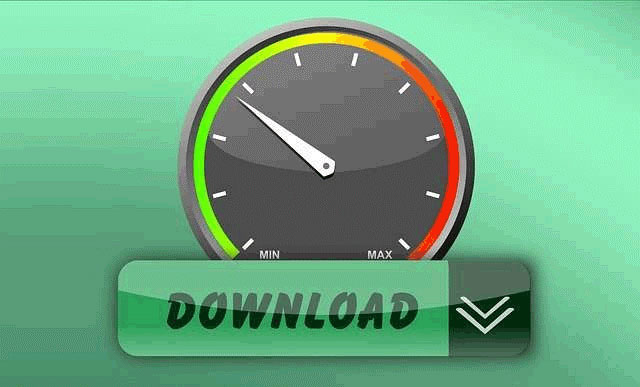
What is a good internet speed?
-
Well, basically, streaming standard definition video requires at least 3 Mbps download speed, 5 Mbps for streaming full HD, and 25 Mbps download speed is required for Ultra HD videos. However, If you want to connect many devices at once, you'll need higher speeds.
-
Multiple devices necessitate increased bandwidth. If you want to stream 4K video and have many devices connected to your network at the same time, you should seriously consider upgrading your speeds, like 200 Mbps, which should be ideal for the majority of households.
-
Use wired connections or 5G if possible. Those that use a lot of data will desire faster speeds and greater capacity. Gigabit speed internet plans are the finest you can get for residential connections when they're accessible.
-
Know your needs. To know your internet performance, it's necessary to know what activities you use the internet for and then check your internet connection to see whether you're getting the bandwidth you paid for.
What is fast download speed?
100 Mbps or above is considered fast and can manage numerous online activities for multiple users at once without severe service disruptions.
Compared with 1.0 GB/s - 10 GB/s, the 5G speeds are considered ultra fast.
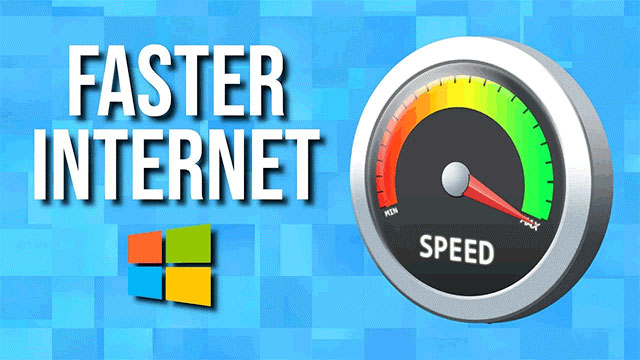
What is a good internet?
What should my download and upload speed be?
You're undoubtedly asking yourself this question when it's time to renew your internet plan, if not every time you pay your bill.
With the growing needs for streaming, gaming, and connected gadgets - not to mention work and school – determining which plan best suits you and your family isn't easy.
You may occasionally experience swift connections on your laptop, phone, or tablet, while other times you may be perplexed as to why your connections are so slow.
Perhaps your game becomes unresponsive when someone else in the home starts playing music.
Perhaps your Netflix video keeps buffering just as you're getting to the greatest part of it.
What is a good internet for wifi?
According to the Federal Communications Commission (FCC), good ISPs for two or more connected devices and moderate to heavy internet use should have speeds of at least 12 megabits per second (Mbps).
Groups of four or more devices need 25 Mbps.
Although being much faster than wifi, 5G network will not be a substitute for wifi.
5G vs wifi
As network rollouts proceed and companies make strategic decisions about how their IT infrastructure should grow, the two technologies will most likely coexist for a while.
In certain situations, the latest cellular technology can assist alleviate some of the problems that come with Wi-Fi installations.
5G will be approximately 64 times quicker than 4G because of its minimal latency.
Each user's time savings will undoubtedly vary, however, the typical consumer who switches to 5G speeds from 4G will be able to complete the following: Instead of taking 7 minutes to download an HD movie, it only takes 6.
Gaming on 5G is blazingly fast, but you need a reliable connection.
5G can reach 10 Gbps per second in terms of raw speed, which is quicker than many people's Wi-Fi connections.
While 5G can reach download speeds of up to 20 Gbps and upload speeds of up to 10 Gbps, the realistic speed measured on fiber optic connections is 100 Gbps.
The fact that each cell/station can have an expanse of up to a few hundred meters whereas a fiber-provisioned signal can travel up to 70 kilometers is a significant disadvantage of employing 5G technology.
Thus, 5G will not be faster than fiber.
While 5G can reach download speeds of up to 20 Gbps and upload speeds of up to 10 Gbps, the realistic speed measured on fiber optic connections is 100 Gbps.
The fact that each cell/station can have an expanse of up to a few hundred meters whereas a fiber-provisioned signal can travel up to 70 kilometers is a significant disadvantage of employing 5G technology.
Conclusion
The pandemic COVID-19 has led to a spike in remote working. The rise in the number of people connected to the Internet means high speeds are always in demand. The introduction of a 5G network with incredible speed, and reduced latency could eventually change the way we use technology. We've learned everything about 5G, how fast is 5G download speed as well as what this new wireless technology can bring to the digital landscape.
Follow MySpeed for more interesting articles.
References:
https://www.digitaltrends.com/mobile/how-fast-is-5G/
https://www.forbes.com/sites/bobodonnell/2019/11/22/real-world-5G-speeds/
![Why is my download speed so SLOW but upload FAST: 3+ causes [Updated]](https://gospeedcheck.com/filemanager/data-images/Why-is-my-download-speed-so-slow-but-upload-fast_1.jpg)
![Why is my Xbox download speed so slow? 5 little-known reasons [SOLVED]](https://gospeedcheck.com/filemanager/data-images/Why-is-my-Xbox-download-speed-so-slow_1.jpg)



4 Comments
Karen Davies
Why is my 5g download speed at around 8-9Mb/s when my connection is 190mb/s? What are the factors limiting my download speed?
Leave a Comment
Your email address will not be published. Required fields are marked *MySpeed
You need to read your contract carefully. The advertised speed is not your actual speed, but “up to” speed
Leave a Comment
Your email address will not be published. Required fields are marked *Laura Miller
Why are 5G download speeds in the US less as compared to other countries?
Leave a Comment
Your email address will not be published. Required fields are marked *MySpeed
You can find the information about US Internet speed in this post: https://gospeedcheck.com/article/average-download-and-upload-speed-in-us-811
Leave a Comment
Your email address will not be published. Required fields are marked *Leave a Comment
Your email address will not be published. Required fields are marked *